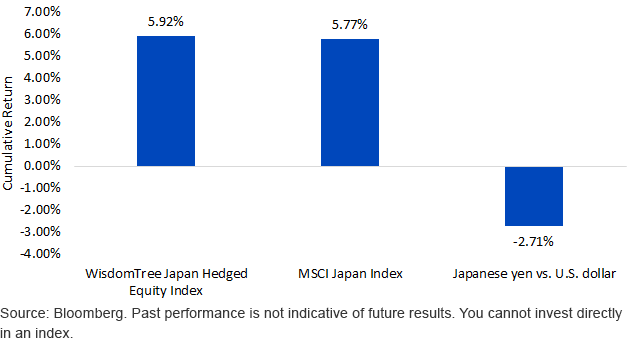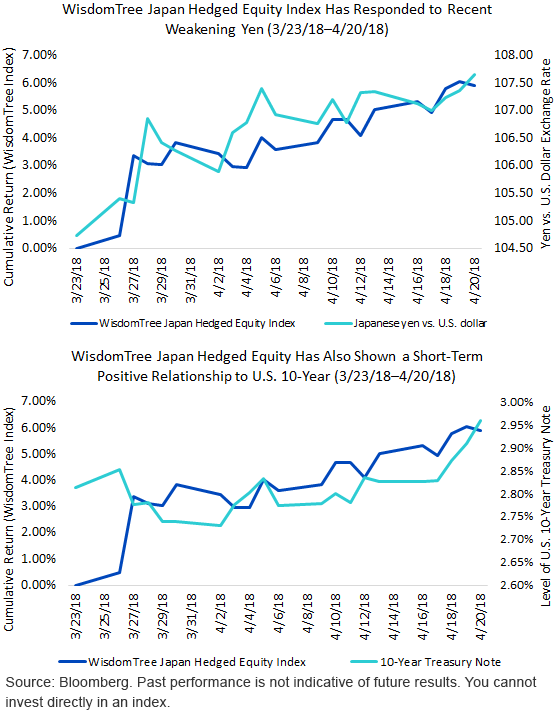How a Weaker Yen Affects Japanese Exporters


It is widely known that Japanese equities tend to have an inverse relationship to the performance of the yen. Namely:
- When the yen is appreciating, Japan’s stocks face a stiff headwind and tend not to deliver their strongest returns.
- When the yen is depreciating, Japan’s stocks tend to find themselves in a much more favorable environment and have delivered much stronger performance.
When we look thus far at 2018, data from Japan’s Ministry of Finance has indicated that more than $30 billion has left Japanese equities from foreign investors.1 Clearly, foreign investors haven’t been happy with Japan as an allocation, and a probable factor contributing to this activity is that people have seen the headline number for the Japanese yen/U.S. dollar exchange rate touching below 105—quite a strong level!
Warning: Yen Does Not Move in a Single Direction
While foreign investors would clearly prefer to see the yen/U.S. dollar exchange rate touching levels above 110 and moving toward 120, we caution them not to forget about Japan just because the yen is currently on the stronger end of its trading range. Markets can move quickly, and during bouts of yen weakness, Japanese equities can be interesting tactical trading ideas.
Example: March 23, 2018, to April 20, 2018, Saw a 2.71% Yen Depreciation—What Did Equities Do?
Japan's Equities Reacted Well to Recent Yen Weakness (3/23/18–4/20/18)

- Clearly, Japan’s equities reacted well to the downward movement in the yen.
- The WisdomTree Japan Hedged Equity Index focuses its approach on exporters—this would lead us to expect that it should respond more strongly to the yen’s moves. We see here—admittedly over a short period—that this was the case compared to the broader MSCI Japan Index.
Key Relationships: The Yen and U.S. 10-Year Treasury Note Interest Rates

- On the left side, we can see the clear relationship between a weakening yen against the U.S. dollar and the performance of the WisdomTree Japan Hedged Equity Index. This is highly related to our first chart—it just shows a way to look at the relationship from a more “across time” or “correlation” perspective.
- On the right side, we can see that there is also a relationship between the WisdomTree Japan Hedged Equity Index and the level of the U.S. 10-Year Treasury note. Historically, we’ve seen a positive correlation between a rising U.S. 10-Year note and the performance of the WisdomTree Index shown here—and with the 10-Year getting very close to 3%, it is important to bring this relationship back to the forefront.
In 2018, the yen had been one of the strongest-performing currencies, despite the rise in the 10-Year. In late April, the yen started coming under more pressure that coincides with the rise in U.S. versus Japanese yield differentials.
We’d point out that from a pure equity valuation perspective, we find Japan to be one of the more attractive markets globally. This starts with the compensation an investor takes to own equities over safer assets like bonds. The earnings yield risk premium over Japanese bond yields is among the highest globally—given a 10-year Japanese government bond yield that is anchored near zero and an earnings yield on WisdomTree’s Index that is almost 7.8%. The comparable ratio for the S&P 500 Index is below 2% given a trailing 12-month price-to-earnings (P/E) ratio that is more than 20x and a 10-year bond yield that is approaching 3%.
Japan’s Equities Look Extremely Attractive Compared to Government Bonds

In our view, if tensions over global trade recede and North Korea risk also seems to fade, Japanese equities seem poised for recovery.
1Sources: Bloomberg, Japan Ministry of Finance, based on data with one-week lag in reporting, current as of 4/13/18.
Important Risks Related to this Article
Investments focused in Japan increase the impact of events and developments associated with the region, which can adversely affect performance.

Christopher Gannatti began at WisdomTree as a Research Analyst in December 2010, working directly with Jeremy Schwartz, CFA®, Director of Research. In January of 2014, he was promoted to Associate Director of Research where he was responsible to lead different groups of analysts and strategists within the broader Research team at WisdomTree. In February of 2018, Christopher was promoted to Head of Research, Europe, where he was based out of WisdomTree’s London office and was responsible for the full WisdomTree research effort within the European market, as well as supporting the UCITs platform globally. In November 2021, Christopher was promoted to Global Head of Research, now responsible for numerous communications on investment strategy globally, particularly in the thematic equity space. Christopher came to WisdomTree from Lord Abbett, where he worked for four and a half years as a Regional Consultant. He received his MBA in Quantitative Finance, Accounting, and Economics from NYU’s Stern School of Business in 2010, and he received his bachelor’s degree from Colgate University in Economics in 2006. Christopher is a holder of the Chartered Financial Analyst Designation.

